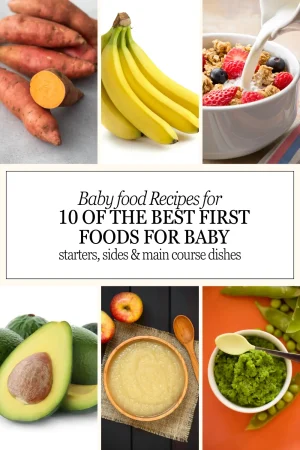Don’t worry! We’ve got you covered with a list of nutritious, easy-to-prepare options that babies love. From creamy avocados to sweet bananas, these foods provide essential nutrients for your little one’s growth and development.
In this article, we’ll explore these top 10 first foods, discuss when to introduce them, and share tips for successful feeding.
Whether you’re a first-time parent or looking to refresh your knowledge, you’ll find valuable insights to help your baby start their solid food journey on the right foot.
Why Choosing the Right First Foods Matters
Before we dive into the top 10 list, let’s talk about why picking good first foods is so important. Think of it like laying the foundation for a house – you want to start with strong, high-quality materials.
The foods you introduce early on can shape your baby’s preferences and eating habits for years to come.
Nutrient-dense first foods provide key vitamins and minerals to support your baby’s rapid growth and development.
They also help your little one discover new flavors and textures. By offering a variety of healthy options, you’re setting the stage for a lifetime of good eating.
When Is Baby Ready for Solid Foods?
So how do you know when it’s time to break out the baby spoon? Here are some signs your little one might be ready to start solids:
- Baby can sit up with good head control
- Shows interest in what you’re eating
- Opens mouth when food approaches
- Has doubled birth weight (usually around 4-6 months)
- Seems hungry even after nursing/bottle-feeding
Always check with your pediatrician before starting solids. Most babies are ready between 4-6 months. Now, let’s get to those top 10 first foods!
10 Nutritious First Foods Your Baby Will Love:

1. Avocado: Nature’s Perfect First Food
Avocados are like nature’s little gift to babies. Packed with healthy fats, fiber, and nearly 20 vitamins and minerals, they’re a nutritional powerhouse. The creamy texture makes them easy for babies to eat, too.
To serve: Mash ripe avocado with a fork until smooth. You can mix in a little breast milk or formula to thin it out if needed.
Pro tip: Avocados oxidize quickly, so prepare small portions fresh each time.
2. Sweet Potato: A Colorful Vitamin A Boost
Sweet potatoes aren’t just delicious – they’re loaded with vitamin A, which is crucial for eye health and immune function. Their natural sweetness appeals to tiny taste buds, making them a popular choice.
To serve: Bake or steam sweet potato until very soft. Peel and mash with a fork, adding liquid to reach the desired consistency.
3. Banana: Portable, Easy, and Nutrient-Rich
Bananas are like nature’s perfect baby food package. They’re easy to mash, packed with nutrients like potassium and vitamin B6, and have a naturally sweet flavor babies love. Plus, they’re so convenient for on-the-go feeding!
To serve: Mash ripe banana with a fork. For younger babies, you may want to thin it out with a bit of breast milk or formula.
4. Iron-Fortified Infant Cereal: A Time-Tested Classic
While not as exciting as some other options, iron-fortified infant cereal is still a solid choice for many babies.
It provides much-needed iron, which is crucial for brain development. Rice cereal used to be the go-to, but now there are great options like oatmeal or barley cereal too.
To serve: Mix cereal with breast milk, formula, or water to a thin, runny consistency. As the baby gets used to it, you can gradually thicken it up.
5. Pureed Peas: Little Green Powerhouses
Don’t let their small size fool you – peas pack a big nutritional punch! They’re high in vitamin C and vitamin A and even provide some protein. The bright green color is visually appealing and helps introduce baby to a new hue on their plate.
To serve: Steam fresh or frozen peas until very soft. Puree in a blender or food processor, adding liquid as needed to reach a smooth consistency.
6. Apple Sauce: A Fruity Favorite
Apples are a great source of fiber and vitamin C. When cooked and pureed into applesauce, they become an easy-to-eat treat that most babies enjoy. The natural sweetness makes apples a hit, but be sure to introduce less sweet foods too!
To serve: Make homemade applesauce by peeling, coring, and cooking apples until very soft. Puree until smooth. For younger babies, you may want to strain it to remove any small lumps.
7. Pureed Carrots: Beta-Carotene Bonanza
Carrots aren’t just for rabbits! These orange veggies are rich in beta-carotene, which the body converts to vitamin A. They have a pleasant, slightly sweet taste that many babies enjoy.
To serve: Steam or boil carrots until very soft. Puree in a blender or food processor until smooth, adding cooking liquid or water to reach desired consistency.
8. Greek Yogurt: Creamy Protein and Probiotics
Greek yogurt is like a nutrition superstar for babies. It’s packed with protein, calcium, and beneficial probiotics that support digestive health. The creamy texture is usually a hit with little ones too.
To serve: Choose plain, whole-milk Greek yogurt. Serve as is or mix with pureed fruit for added flavor. Always check with your pediatrician before introducing dairy products.
9. Oatmeal: Fiber-Rich and Versatile
Oatmeal is a fantastic first grain for babies. It’s rich in fiber, which aids digestion, and contains important nutrients like iron and zinc. Unlike rice cereal, oatmeal has a bit more texture, which can help babies transition to more solid foods.
To serve: Cook oatmeal with water, breast milk, or formula until very soft. Puree if needed for younger babies. As baby gets older, you can leave it a bit chunkier.
10. Pureed Butternut Squash: Vitamin-Rich and Naturally Sweet
Last but certainly not least, butternut squash is a nutritional powerhouse that babies tend to love. It’s rich in vitamins A and C, has a naturally sweet flavor, and has a smooth texture when pureed.
To serve: Bake or steam butternut squash until very soft. Scoop out the flesh and puree until smooth, adding liquid as needed.
Tips for Successfully Introducing Solid Foods
- Be patient – learning to eat is a process!
- Make mealtime fun and stress-free
- Eat together as a family when possible
- Offer a variety of flavors and textures
- Don’t force feed – let baby set the pace
- Be prepared for mess – it’s part of the learning process!
Conclusion: A World of Flavors Awaits
Starting your baby on solid foods is an exciting adventure. These 10 nutritious options are a great place to begin, but don’t be afraid to branch out and try new things. Remember, every baby is different, so what works for one might not work for another.
The key is to offer a variety of healthy foods and let your little one explore at their own pace. Before you know it, your baby will be joining you at the family dinner table, eager to try whatever’s on the menu!
Happy feeding, parents! Here’s to the start of a lifelong love of good food for your little one.
Frequently Asked Questions About Baby’s First Foods
How much should I feed my baby?
When starting solids, think small. Begin with just a teaspoon or two once a day, gradually increasing as your baby shows interest. Remember, breast milk or formula will still be the main source of nutrition for the first year.
Should I introduce foods in a specific order?
There’s no strict rule about food order anymore. However, it’s a good idea to introduce single-ingredient foods one at a time. Wait a few days between new foods to watch for any potential allergic reactions.
What about food allergies?
Recent research suggests introducing common allergens (like peanut butter, eggs, and fish) earlier may actually help prevent allergies. Always consult your pediatrician first, especially if there’s a family history of food allergies.
Can I make my own baby food?
Absolutely! Homemade baby food can be a great option. It’s often more economical and allows you to control exactly what goes into your baby’s food. Just be sure to follow proper food safety guidelines.

2 thoughts on “10 Of The Best First Foods For Baby (Purees & Baby-Led Weaning)”